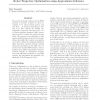Free Online Productivity Tools
i2Speak
i2Symbol
i2OCR
iTex2Img
iWeb2Print
iWeb2Shot
i2Type
iPdf2Split
iPdf2Merge
i2Bopomofo
i2Arabic
i2Style
i2Image
i2PDF
iLatex2Rtf
Sci2ools
113
click to vote
ICML
2009
IEEE
2009
IEEE
Robot trajectory optimization using approximate inference
The general stochastic optimal control (SOC) problem in robotics scenarios is often too complex to be solved exactly and in near real time. A classical approximate solution is to first compute an optimal (deterministic) trajectory and then solve a local linear-quadratic-gaussian (LQG) perturbation model to handle the system stochasticity. We present a new algorithm for this approach which improves upon previous algorithms like iLQG. We consider a probabilistic model for which the maximum likelihood (ML) trajectory coincides with the optimal trajectory and which, in the LQG case, reproduces the classical SOC solution. The algorithm then utilizes approximate inference methods (similar to expectation propagation) that efficiently generalize to non-LQG systems. We demonstrate the algorithm on a simulated 39-DoF humanoid robot.
Classical Approximate Solution | Classical Soc Solution | ICML 2009 | Machine Learning | Optimal Trajectory |
Related Content
| Added | 17 Nov 2009 |
| Updated | 17 Nov 2009 |
| Type | Conference |
| Year | 2009 |
| Where | ICML |
| Authors | Marc Toussaint |
Comments (0)

